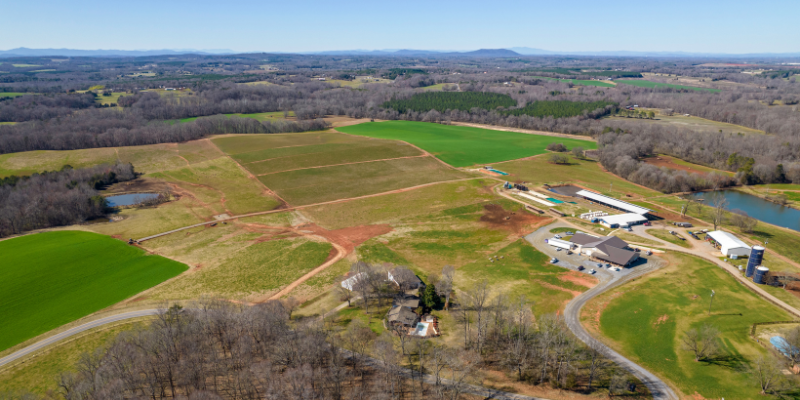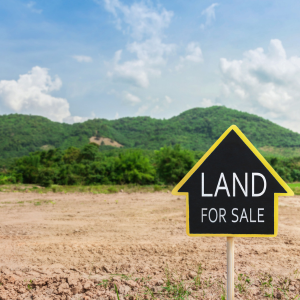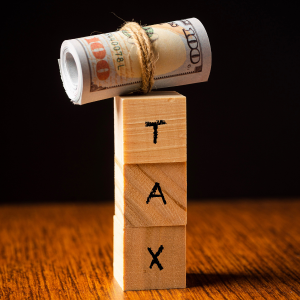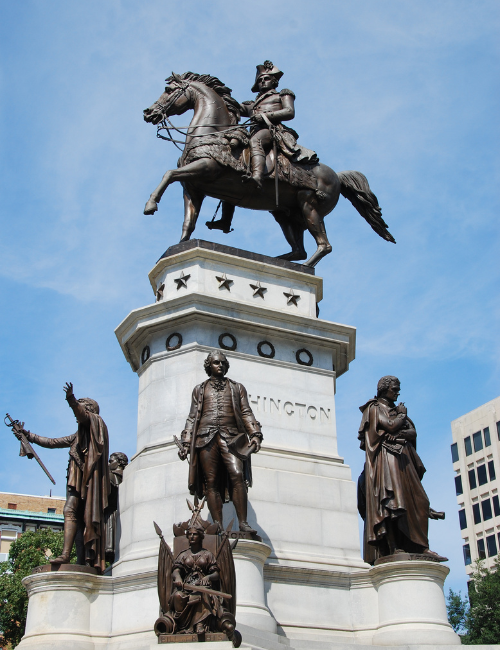
Quick & Easy Guide to Selling Inherited Land in Virginia
Selling inherited land in Virginia isn’t like selling your inherited house. There’s more paperwork, more waiting, and more headaches. But there’s also potentially more money after the sale, especially with the tax breaks that come with inherited property in Virginia.
This guide will walk you through everything you need to know about selling inherited land in Virginia. We’ll cover the initial legal requirements up until closing day. We’ll also talk about the probate process, tax strategies, and your various selling options!
Types of Property Inheritance in Virginia
In most cases, how you got the inherited land in Virginia directly affects how fast you can sell it. Some inheritance types let you list the property tomorrow, while others require months of court approval first.
1. Will-Based Inheritance
In this type of inheritance, someone specifically left you the property in their will.
It sounds simple, but the court must still validate everything and ensure that all debts are paid first. This usually means probate court involvement before you can sell your inherited land in Virginia.
2. Intestate Inheritance
The property owner died without a will, so state law decides who gets what. Spouses and kids get first dibs, then parents and siblings. This almost always requires probate court time, which means more waiting for your Virginia inherited land sale.
3. Trust-Based Inheritance
The property was placed in a living trust before the owner died. This is the fastest type of inheritance. Here, you can often skip probate entirely and sell inherited land in Virginia much faster.
4. Joint Ownership with Survivorship Rights
You were already a co-owner, and now you automatically own the whole Virginia land. There’s zero court involvement, so you can quickly sell inherited land in Virginia.
5. Lady Bird Deeds
This means the Virginia property owner used an Enhanced Life Estate Deed to transfer ownership while keeping control during their lifetime. When they died, you got instant ownership without probate hassles.
Can I Sell Inherited Land in Virginia?

Yes, you can sell inherited land in Virginia, but your ability depends on whether you own it. If the property must go through probate, you’ll need court approval before selling. Until probate wraps up, you don’t technically own the property, so you can’t sell what isn’t yours yet.
In Virginia, properties passed down through trusts or joint ownership usually transfer right away, allowing you to move forward with a sale quickly. Many owners also ask, can I gift land to a family member as an alternative to selling? This option is possible but comes with specific legal and tax considerations.
Note, however, that multiple heirs can mean complications. Everyone must agree to sell unless legal documents say otherwise. Outstanding debts and liens can also block sales until they’re resolved.
Your local probate court or real estate attorney in Virginia can tell you precisely what restrictions might apply to your situation. Fast Land Offers can help guide you through the process and connect you with the right professionals if needed.
The Virginia Probate Process for Inherited Land
Probate sounds scary, but it’s just the Virginia court making sure everything gets adequately handled after someone dies. They want to see that debts get paid and assets go to the right people.
When Probate Court Is Required
You’ll end up in probate court if the person died without a will or if their will needs official validation. Debts attached to the property also trigger probate. The court wants to ensure creditors get paid before heirs get their inheritance.
Most properties worth over $75,000 go through probate, though your primary residence gets special treatment.
Working with Probate Attorneys
Probate attorneys speak court language, so you don’t have to learn it when selling inherited property in Virginia. They handle the paperwork mountain and deal with cranky creditors. You’ll pay $3,000-$5,000 for usual cases, or they’ll take 3 to 5% of the estate’s total value.
This is worth every penny when you’re already dealing with losing someone close to you.
Virginia Probate Timeline and Costs
You should expect a minimum of 6 to 12 months for simple probate cases. Add more time if family members start fighting or the estate is complicated.
Court fees run around $400, but attorney costs, appraisal fees, and publication requirements add to the total. We suggest budgeting $5,000 to $10,000 for a typical case or more if things get messy.
Summary: Administration vs. Formal Administration
Summary administration is probate’s fast lane for smaller estates under $75,000 or when someone died more than two years ago. Here, you’re looking at just 4 to 6 weeks instead of nearly a year.
Formal administration handles bigger, more complex estates with full court supervision and way more paperwork.
How to Sell Inherited Land in Virginia

Nobody prepares you for inherited land in Virginia. One day, you’re going about your everyday life, and the next day, you’re a landowner dealing with probate courts in Virginia, tax implications, and family members who suddenly have opinions about everything.
If you’re overwhelmed, here’s a step-by-step guide to selling an inherited property in Virginia!
Step 1: Establish a Clear Title and Ownership
You probably don’t technically own this inherited land in Virginia yet. Even though Uncle Jim left it to you, the property still legally belongs to his estate until you go through the process.
You need to get that deed transferred into your name first, or you’ll try to sell something that isn’t yours. The first step is to go to the county clerk’s office in Virginia and tell them what’s happening. They’ll walk you through the paperwork needed to sell and tell you how long it will take.
Some transfers happen in a few weeks if everything’s clean. Others may take months if there are complications or court backlogs. Either way, this step occurs first, or nothing else matters.
Step 2: Gather Required Documents for Selling Inherited Land in Virginia
Next, you need to channel your inner detective and find every piece of paper related to this inherited property in Virginia. You’ll need the death certificate, will or trust documents, probate court orders, and the current property deed. You’ll also need to dig up recent tax records, mortgage info, and anything about liens.
Pro Tip: Find that property survey if it exists. Buyers get nervous when they don’t know precisely what they’re buying. Nothing settles those nerves like a nice, official survey showing all the boundaries.
Environmental reports and zoning documents are also helpful if you can locate them.
Step 3: Resolve Liens and Outstanding Debts
Debts don’t just disappear when someone dies. Maybe there are unpaid property taxes, an old mortgage nobody mentioned, or a contractor lien from that fence project three years ago.
To determine whether a debt is attached to the inherited home or land in Virginia, call the county tax office and ask what’s owed. Then, do a lien search to see what other surprises might be lurking.
Sometimes the estate covers these costs, but sometimes they become your headache. Better to know now than get blindsided during a sale.
Step 4: Get Property Appraised and Assessed
Land values are weird. That “worthless” swamp might be a prime wetland that developers are dying to get. Or that “valuable” lot might sit in a flood zone, making it nearly unsellable.
You won’t know until someone who knows land values takes a look. You may need to spend $300 to $600 for a professional land appraisal in Virginia. Yes, it’s another expense, but it tells you what you’re working with.
Plus, this number becomes your tax basis for capital gains calculations, which could save you way more than the appraisal cost when it’s tax time.
Step 5: Prepare the Virginia Inherited Land for Sale
Nobody wants to buy a jungle. Basic cleanup makes a massive difference in how buyers see your property.
Mow down the weeds, haul away any junk, fix broken gates or fencing, and ensure people can get to the property without any problem. You don’t need to spend thousands here. Just show that someone gives a damn about this land.
Take tons of photos from every angle you can think of. If you’re feeling fancy, hire someone with a drone to get those fantastic aerial shots that make any piece of land look amazing. If you need help or recommendations, feel free to contact us; we’re happy to assist!
Step 6: Choose Your Selling Method
Real estate professionals will work their butts off to get you top dollar, but they’ll take 6 to 10% commission, and the whole process takes months. Selling inherited land in Virginia yourself saves that commission but means you’re doing all the work, including marketing, showing, negotiating, paperwork, basically everything.
Auctions can be exciting and sometimes create bidding wars, but they’re also risky because you might get less than you hoped. Meanwhile, cash land buyers in Virginia are the fastest solution. They’ll close in weeks and buy whatever condition your Virginia inherited land is in, but expect offers around 60 to 80% of market value.
Make sure you choose whatever matches your patience level and money goals.
Step 7: Complete the Sale and Transfer
You’ve got a buyer—awesome! Now, don’t disappear on them. They’ll want inspections, surveys, title insurance, and probably a dozen other things that seem ridiculous but are normal for Virginia inherited land sales.
Answer their questions fast and get them whatever documents they need because dragging your feet here kills deals. At closing, you’ll sign what feels like 500 pieces of paper (unless you sell the inherited land to a Virginia cash buyer) to transfer ownership officially, and then you’ll get paid.
Before you show up, ensure you know who’s paying what closing costs so there are no surprises when settling.
Tax Implications When Selling Inherited Land in Virginia

The rules are different (and usually way better) from a tax perspective than regular property sales. Learning about this stuff can save you thousands.
Capital Gains Tax on Inherited Land in Virginia
Want some good news? When you inherited property in Virginia, the IRS pretends you bought it for whatever it was worth the day the previous owner died. This reset is called a “stepped-up basis.” It erases decades of appreciation that occurred before you got the property.
Let’s say your aunt bought land for $10,000 in 1985, and it’s worth $100,000 when you inherit it in 2024. If you sell it right away for $100,000, you owe zero capital gains tax. The IRS treats your “purchase price” as $100,000, not the original $10,000.
But if you hold onto the land and it grows to $120,000 before you sell, you owe capital gains tax on that $20,000 difference.
How much depends on timing. Sell your land fast in Virginia within a year, and you pay short-term rates (the same as regular income tax, which hurts). Hold it over a year, and you get long-term rates of 0%, 15%, or 20%, depending on your income level.
Property Tax Responsibilities
You’re now a property owner, meaning you get to pay property taxes whether you want this land. If the previous owner was behind on payments, guess who inherits that problem, too? Yep, lucky you.
Call the county tax office immediately and find out what’s owed. Don’t assume everything’s current just because nobody mentioned back taxes. Some counties are fine with payment plans if you’re facing a huge bill, but others want their money now.
Property taxes vary like crazy depending on where your inherited land in Virginia is. Rural farm land barely gets taxed, while land near cities or developments can cost serious money every year.
Some places offer special rates for agricultural or forestry use that can cut your bills way down. It’s worth asking about these programs; the worst they can say is no.
Estate and Inheritance Tax Considerations
Another good news for you! Federal estate taxes are only triggered by assets over $13 million. Unless your relative was secretly loaded, this probably isn’t your problem.
This only gets complicated with truly massive estates that owe federal taxes. Then the estate has to pay the government before distributing anything to heirs, which can delay your ability to sell inherited land in Virginia.
Sometimes, estates even sell properties just to cover the tax bills.
Challenges of Selling Inherited Land in Virginia with Multiple Heirs
Sharing inherited land in Virginia with family sounds great until money gets involved. Then everyone becomes a real estate expert with strong opinions about timing and pricing.
Dealing with Disagreements Among Beneficiaries
Your sister needs cash now for her kid’s college. Your brother wants to keep Great-Grandpa’s land forever because of “family heritage.” Your cousin thinks it’s worth twice the appraiser’s number because she heard about some big sale three counties over.
Get everyone talking early before positions get set in stone. Have a real family meeting and figure out what people need.
Some want quick cash, others can wait for top dollar. Find a middle ground that works for most people, because waiting for unanimous agreement usually means never selling.
Keep everyone in the loop constantly. Send group texts about offers and market updates. Nothing creates family drama faster than someone feeling left out of big decisions.
Partition Sales and Court-Ordered Sales
When family talks are no longer possible, you can ask a judge to force a sale through a partition action. You’re telling the court that you can’t all play nicely together and need grown-up supervision.
The judge will either split the property physically (if that makes sense) or order it sold with everyone getting their cut of the proceeds.
Physical splits sometimes work when you’ve got lots of acres, but the court usually orders a sale because you can’t exactly see a piece of inherited land in half.
Note: Partition lawsuits are expensive, slow, and often result in lower sale prices because buyers know you’re desperate. But sometimes it’s the only way to break a problematic sale when stubborn family members are not cooperative.
Buyout Options for Co-Owners
One of the cleanest solutions is for one person to buy out everyone else. Get a professional appraisal so everyone knows the real numbers, then whoever wants to keep the inherited property can pay the others their fair share.
This works great when one person has the money or can get a loan, and it keeps peace in the family. Outside investors sometimes buy out individual heirs’ shares, then deal with the remaining family members separately.
It’s not perfect, but it gives people options when family negotiations go nowhere.
Why You Should Consider Selling to Virginia Cash Buyers
Virginia cash land buyers are fast, convenient, and don’t ask many questions. These companies specialize in buying inherited land in Virginia quickly with minimal hassle.
They’ll make you an offer within days of looking at your property, close in 2 to 4 weeks, and buy whatever condition your inherited land in Virginia is in. You don’t need to clean, survey, or fix anything. They handle all the paperwork and often cover closing costs, too.
The catch is that cash buyers typically offer below market value. That might sound low, but remember you’re saving months of carrying costs, agent commissions, and the risk of deals falling through.
If your inherited Virginia land needs $10,000 in cleanup work and you’d pay $8,000 in agent fees anyway, that cash offer starts looking pretty reasonable.
Key Takeaways: How to Sell Inherited Land in Virginia Fast & Easy!
Selling inherited land in Virginia takes patience and realistic expectations. As we’ve shared here, you should start by determining your inheritance type and whether probate is required.
You must also organize your paperwork early and take advantage of the stepped-up basis rule for tax savings. Multiple heirs also complicate everything, so you have to communicate early about goals and timelines.
Depending on your priorities, you’ve got several selling options: agents for maximum exposure, FSBO to save commissions, auctions for speed, or cash buyers for convenience.
Don’t let inherited land in Virginia become a burden with ongoing taxes and maintenance costs. If you want a quick sale without the typical complications, contact Fast Land Offers at (843) 606-1001 for a fair cash offer on your inherited property in Virginia.
Helpful Virginia Blog Articles
- Can You Sell Land if You’re in Foreclosure in Virginia
- How to Sell Inherited Land in Virginia
- How to Sell Land With a Lien in Virginia
- Can You Sell Land if You Owe Taxes in Virginia
- How to Sell Land Without an Agent in Virginia
- Paperwork for Selling Land by Owner in Virginia
- How to Find Out the Zoning of My Land in Virginia
- How to Sell Land with Mineral Rights in Virginia

Sell Your Land The Easy Way: Get Your Cash Offer Below…
We are direct land buyers. There are no commissions or fees and no obligation whatsoever. We buy land in 30 days or less! Start below by sharing where your property is and where we can send your offer…